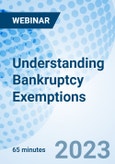Learn about the exemptions available under the Bankruptcy Code.
Whether you are a creditor, represent a debtor or a creditor, or are just dying to know about bankruptcy exemptions, this course has something for everyone. This topic will discuss exemptions available under the Bankruptcy Code. There will be discussions on state versus federal exemptions and their differences. This material will provide a perspective from both a debtor’s point of view and a creditor’s point of view. As important as it is to learn about exemptions from both sides, it is just as or even more important to learn how the bankruptcy trustee is involved, what the trustee is looking for, and what duties the trustee has. Additionally, the speakers will also discuss what happens to the property of the estate that cannot be exempted or when a creditor has been successful in objecting to exemptions. This panel will highlight exemptions from a 30,000-foot view and break down the ins and outs of using and objecting to exemptions.
Learning Objectives
- You will be able to discuss exemptions in a bankruptcy available under 11 U.S.C. §522.
- You will be able to identify what exemptions exist for a debtor and how choosing the right exemption could affect the case.
- You will be able to recognize as a creditor how to review and object to exemptions in a bankruptcy case and how that could affect your proof of claim and treatment.
- You will be able to describe the trustee’s role regarding reviewing and objecting to exemptions.
Agenda
Overall View - Exemptions Under 11 U.S.C. §522
- Exemptions Available Under the Bankruptcy Code
- Federal vs. State Exemptions
- Identifying Which Exemptions to Utilize and When
- Overall Trustee Involvement; How Choosing the Right Exemption Could Affect the Case
Exemptions in Detail (Debtor and Creditor Perspective)
- Proper Completion and Valuations in Schedules
- Identifying Relevant Exemptions
- Use of Exemptions From the Individual Debtor’s Perspective
- What Happens When Exemptions Run Out?
- Judgment/Liens Impairing Exemptions
- CARES Act Update - Can You Exempt Stimulus Payments?
- Reviewing Schedules and Exemptions as a Creditor
- Objections to Exemptions, When, How, and Why
Trustee Involvement
- Reviewing Schedules and Valuation
- Evaluating Potential Assets of the Estate and Whether an Exemption Has Been Claimed
- Investigating Assets, Including Those Exempted
- Are the Assets Properly Valued?
- Is the Exemption Properly Used?
- What Legal Options Are Available to Trustee for Nonexempted Assets
- Objecting to Claimed Exemptions
- Objecting to Discharge
- Avoidance Claims
- Referrals to United States Trustee
Exempted Assets After Bankruptcy
Speakers

Keri P. Ebeck,
Bernstein-Burkley, P.C.- Partner-In-Charge of the Bankruptcy Practice group at Bernstein-Burkley, P.C.
- Practice focuses primarily on consumer and commercial bankruptcy for creditors
- Conducts regular seminars/live webinars and workshops on bankruptcy on a national level
- Represents creditors nationally and is admitted to practice in Pennsylvania, New Jersey, Northern District of Ohio, all four districts of Texas, Southern and Northern Districts of Indiana, Third Circuit Court of Appeals and U.S. Supreme Court
- Received American Legal and Financial Network (ALFN)’s 2017 JPEG: Picture the Future Award
- Immediate past chair of Bankruptcy and Commercial Law Section of the Allegheny County Bar Association, current vice-chair of the Finance Committee of Allegheny County Bar Association, current vice-chair of the Investment Committee of the Allegheny County Bar Association; member of American Legal Financial Network (ALFN), Bankruptcy and Women in Legal Leadership committees, member of Legal League 100, member of Turnaround Management Association, and Finance chair of Judith K. Fitzgerald Bankruptcy Inns of Court
- Can be contacted at 412-456-8112 or kebeck@bernsteinlaw.com
Who Should Attend
This live webinar is designed for attorneys, paralegals, presidents, vice presidents, branch managers, loan officers, loan department personnel, credit and collection managers, and accountants.









